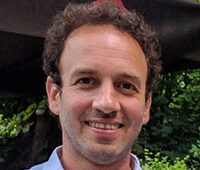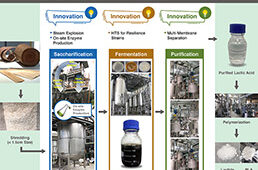Nano-Sharp co-founder Saif Islam, a UC Davis engineering professor, loads a silicon wafer into a machine that etches razor patterns. Kevin Tong/UC Davis photo |
A
new startup company at the University of California Davis aims to bring you a better shave
through semiconductor manufacturing technology. Nano-Sharp Inc. plans to
use silicon wafers to make razor blades and surgical tools far more
cheaply than current silicon or ceramic blades.
It’s
one of three new companies in the College of Engineering’s incubator,
the Engineering Translational Technology Center. The new businesses hope
to grow into viable companies that attract private funding.
“Every
single one of these companies is looking at a multibillion dollar
market,” said Jim Olson, the center’s business specialist and a visiting
assistant professor at the UC Davis Graduate School of Management.
Nano-Sharp
co-founder Saif Islam, professor of electrical and computer
engineering, said that inspiration came when his team was working on
making solar cells from silicon wafers. They were etching the wafers to
create thin vertical walls standing up from the surface.
“We
accidentally made some ‘bad’ walls that were very sharp,” he said. “We
realized that we could mount them and use them as blades.”
Ceramic
or silicon blades are extremely sharp and keep an edge much longer than
metal blades. But they are very expensive, so their use is limited to
high-end kitchen knives and surgical tools. For example, a ceramic
scalpel for eye surgery costs about $600, Islam said.
Conventional
blades are made by sharpening the edge of a silicon wafer, Islam said.
In contrast, his new, patented technique creates blades across the
surface of the wafer.
The
cutting edge of the blade is just a few atoms across, Islam said. “They
have atomic sharpness approaching that of a diamond blade that metal
blades cannot exhibit.”
The
performance of these crystalline blades can be improved using
technologies developed by the semiconductor industry over the last 50
years, Islam said.
Islam
recently won a Proof of Concept award from the University of California
to develop a prototype to attract private investors to back the
company.
Co-founders
of the company are Logeeswaran V. Jayaraman, postdoctoral researcher in
Islam’s laboratory, and David Horsley, professor of mechanical and
aerospace engineering.
Other new tenants
Other
new tenants in the incubator are mRhythm and Barobo Inc. Founded by
Professor Tingrui Pan of the Department of Biomedical Engineering,
mRhythm is developing sensors for personal home health monitoring. The
small, flexible sensors can be worn by patients at home to record data
such as heart rate, breath sounds and patterns, transmitting the
information wirelessly to healthcare professionals.
Educational
robotics company Barobo, founded by Professor Harry Cheng of the
Department of Mechanical and Aerospace Engineering and former graduate
student Graham Ryland, has its physical office at the Davis Roots
incubator in the city of Davis. It is working with ETTC for advice on
business development and fundraising.
Continuing tenants
Ennetix
Inc. (formerly PutahGreen Systems) is focused on dramatically reducing
the energy consumed by IT networks and connected systems across the
world. The company was founded on research by Biswanath Mukherjee,
distinguished professor of computer science, and licensed exclusively to
Ennetix. The company recently hired Jonathan Symons as its chief
executive officer and closed its first round of angel funding.
Inserogen
is a biotech startup based on using tobacco plants as “biofactories”
for high-value recombinant proteins, life-saving therapeutics and
vaccines. The technology is quick, scalable and cost effective.
Inserogen was the first prize winner of the 2010 Big Bang! Business Plan
Competition at UC Davis. Founders Lucas Arzola and Professor Karen
McDonald have won grants from the National Collegiate Inventors and
Innovators Alliance (NCIIA) and the National Science Foundation
Innovation Corps program, allowing them to develop a proof of concept
and to explore the commercialization potential of this proprietary
technology.
ETTC
was established in 2010 to help technology startups, based on
intellectual property developed at UC Davis, grow and attract support
from external financial investors. The center provides companies with
space close to the college’s laboratories as well as support, mentorship
and introductions to potential investors and strategic partners.
Members are selected for admission into the business incubator through a
review process that includes an assessment of the commercial potential
of the faculty research and its readiness for commercial development.
Source: University of California Davis





